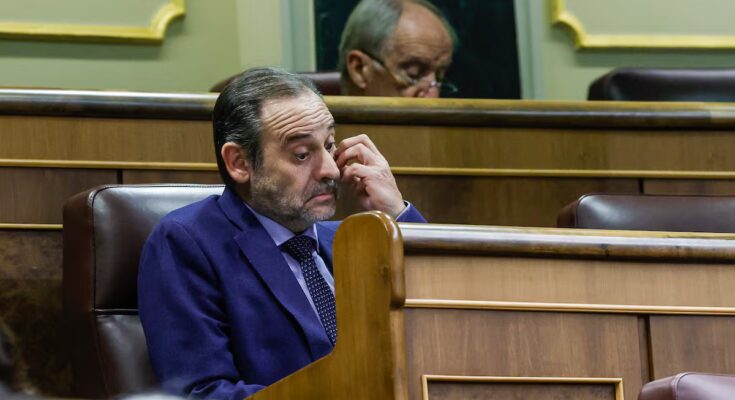“At the rate of an unbalanced education, (Ábalos) is condemned to a hot mess in which he can only struggle in vain while claiming his innocence.” In these terms, former Transport Minister José Luis Ábalos and his former ministerial advisor Koldo García appealed to the Supreme Court against the accusation of a corruption conspiracy linked to the purchase of masks during the pandemic. The defense points out that the investigations lack evidence to go to trial and that the right to defense and “parliamentary immunity” were not respected.
It was last Monday when Criminal Chamber magistrate Leopoldo Puente proposed to try former minister Koldo García and businessman Víctor de Aldama for alleged irregularities in 2020, when Ábalos was in government. The judge concluded that the three could have committed crimes of corruption, membership of a criminal organisation, influence peddling and misappropriation of public funds, considering that the former minister would have favored the entrepreneur’s “preferential access” to public contracts in exchange for the “corresponding economic advantage” which translated into money or holiday rentals.
Ábalos’ lawyer, former prosecutor Carlos Bautista, explains that the investigation ended without the former minister having been able to have access to the digital material that the Guardia Civil had seized during the house searches and without any of the procedures he requested having been agreed upon. “The issuance of an abbreviated procedure without prior access to forensic devices brutally limits the right to defense,” reads the appeal to which EL PAÍS had access.
In his opinion, the case was conducted in a non-transparent manner and the assessment checks were skipped, as the investigation had started long before the request was submitted. “It is not possible to open an investigation against a representative or senator without the prior authorization of the Chamber of Deputies or the Senate.” It particularly reflects an episode in which in 2023 Koldo’s brother, Joseba García, went to Valencia with documentation in a sealed envelope for the former minister and the Central Operations Unit (UCO) of the armed institute organized an operation to intercept the material. “It seems to obey a general tone of disrespect for immunity,” Bautista says. And he adds that this “episode is by no means isolated”.
Koldo goes in the same direction and recalls that the investigating judge must not only implement the procedures formulated by the prosecution, but also those that “can favor the defense of the accused”. And in this sense, he says that if Aldama paid for years the rent of the apartment of Jésica Rodríguez, Ábalos’ ex-partner, with a monthly income of 2,700 euros, it is not clear “why the beneficiaries of that corruption, in this case, Jésica Rodríguez herself, are not investigated”.
The same applies to the crime of influence peddling. If Koldo’s influence in the Ministry of Finance managed to postpone a debt incurred by one of Aldama’s trading companies, how is it possible that this company or the head of cabinet of the Minister of Finance, Carlos Moreno, who testified in the investigation as a witness, are not under investigation. “The fundamental right of defense is violated by depriving this party of carrying out the investigative procedures necessary to contradict the facts,” writes lawyer Leticia de la Hoz.
Ábalos’ appeal reiterates that the “folios” that the UCO translates into cash are simply documents that the politician needed due to his printing habit, but that he was not allowed to prove it because they do not pay attention to his requests for information to Congress. This disproves all the points in Ábalos’ financial statement, such as the fact that Aldama paid Koldo and he covered his expenses without compensation. “There is no evidence linking our client to the alleged payment of 10,000 euros per month,” he underlines.
It says that if Koldo “advanced expenses,” then they were always “returned” by Ábalos and that the UCO forgot to include in the comparison the income and cash provisions that his ex-wife, Carolina Perles, “generated income that also contributed to the family economy.”
Aldama and the “mermaid songs”
Bautista’s appeal also highlights the possibility of an agreement between Aldama and the Prosecutor’s Office and the negative consequences this entails for the rest of the defendants. “There is no other verification, beyond the word of the repentant,” he says regarding what the commissioner declared. “The refusal to comply of those who know they are innocent and are subjected to pressure from others, or the siren song of extremely advantageous offers, can be damaged by a whole series of more or less opaque negotiations between the prosecution and the rest of the defense,” he writes.
Ábalos claims that what happened with Aldama generates a “lack of guarantees” and “legal security”. “A space is created for paraprocedural (clandestine) negotiations between the prosecutor and the defense,” they say. Koldo follows the same line and recalls that “two people in equal situations must have equivalent treatment” in criminal investigations.



